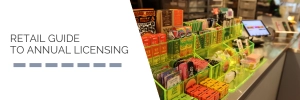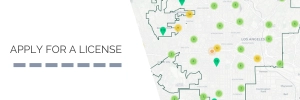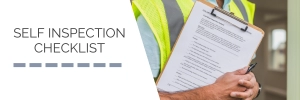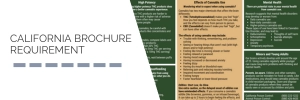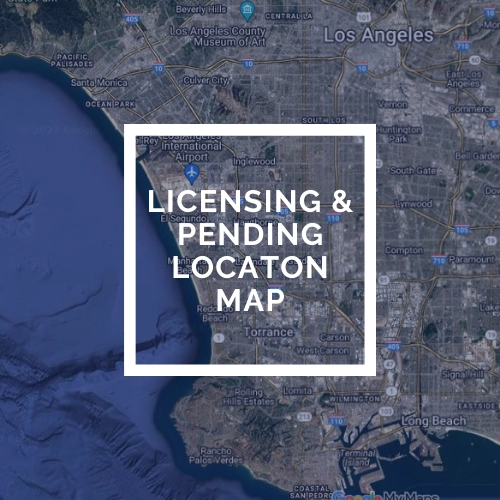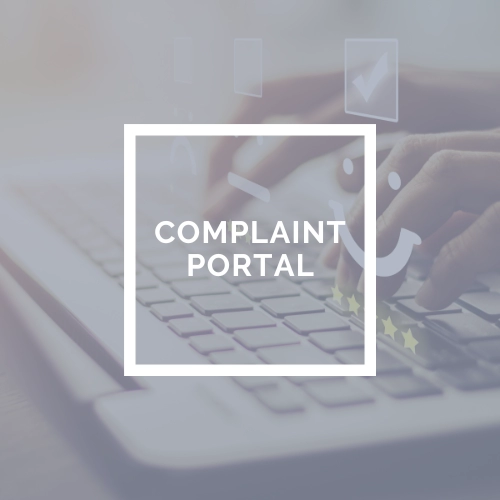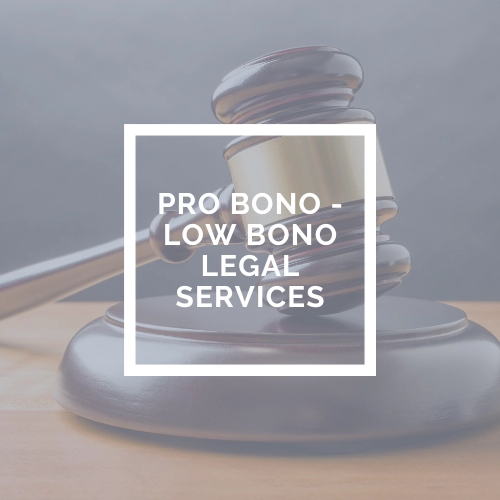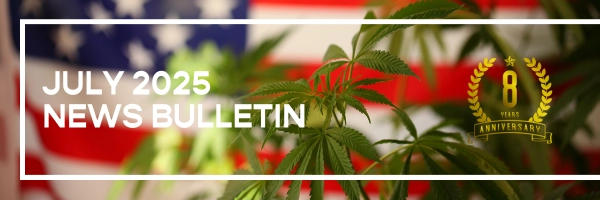
Greetings!
I’ve recently returned from family leave and I’m ready to re-dedicate myself to this Department and to the stakeholders it serves - providing focused attention, clarity, and care.
Despite progress, the cannabis industry remains fraught with challenges that demand continued resilience and support. From the start, DCR has tried to build something meaningful based on adopted laws: transitioning existing medical marijuana dispensaries to the legal market and temporary approvals to the more permanent annual licenses; offering priority processing; equity share review; financial assistance; free and low cost legal support; coaching; and educational webinars. Despite the best of intentions, not all City processes work perfectly. Concerns about Department procedures have been voiced for different reasons in the past and now. The Department hears and takes those concerns very seriously. DCR has pivoted to find solutions where it could and will continue to do so.
Yet, DCR and its stakeholders continue to face challenges navigating competing interests, systemic underinvestment of cannabis infrastructure, a prevalent illicit cannabis market and DCR’s limitations to work within the parameters of local and national laws set by others many years ago, including taxation rates. The concerns raised are valid and reflect real, ongoing struggles — many of which are tied to entrenched systems and legal frameworks beyond DCR’s control. However, we remain steadfast in our commitment to pushing for change from within and ensuring that your concerns continue to be elevated and addressed.
We must acknowledge that participating in the cannabis industry comes with inherent challenges. Federal prohibition presents issues that other industries do not have to face—from not being able to have a bank account to struggling to find compliant real estate. The cannabis industry comes with challenges other business owners will never have to experience.
DCR’s most recent challenge is an updated comprehensive fee schedule that has been met with opposition. Please understand that this fee study was necessitated by law and is central to DCR’s ability to continue serving this community effectively and equitably. It was undertaken to ensure DCR’s fee structure reflects the true cost of regulating the commercial cannabis industry in full compliance with City ordinances and State law.
That being said, I want to take a moment to address some misinformation circulating about the Department’s updated fee study.
- The study was discussed in multiple public forums, including three hearings at the Government Operations Committee, where stakeholders were able to engage directly. No voice has ever been silenced or denied.
- The proposed fee increases have nothing to do with California’s Local Jurisdiction Assistance Grant and issues DCR and the State are currently negotiating.
- Finally, I want to speak to concerns that this process ignored equity impacts. DCR has actively pursued and secured Cannabis Equity Grant funding and will continue to use that support to waive or offset costs where allowed by law.
I want to acknowledge the pain and frustration many have expressed. Please know that the staff at DCR believe in this mission. It’s easy to feel like no one at the City cares. But I assure you, DCR does. DCR has to navigate limited resources, competing needs, and make challenging decisions. This year specifically, the City had to make very difficult decisions. I want to commend the City Council for doing just that in the most recent budget. As Councilmember Bob Blumenfield said, they had to take a really bad budget and make it less bad. That’s the nature of this work.
I assure you DCR is committed to doing better, together.
Lastly, I want to note that on Wednesday, July 2, 2025 at 3:30 PM the Cannabis Regulation Commission (CRC) will be hosting a town hall to give applicants, licensees, and trade organization representatives an opportunity to discuss their experience with L.A.’s cannabis tax structure.
Best,
Michelle Garakian
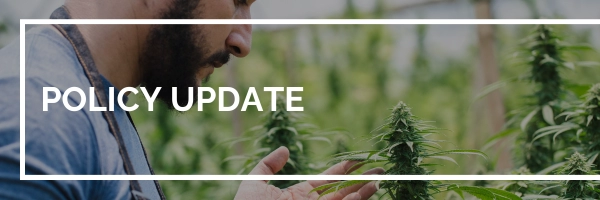
Update on DCR’s Retail License Application Lottery
Earlier this year, DCR opened the opportunity for individuals to seek verification as Social Equity Individual Applicants. The designation provides those most impacted by the War on Drugs the ability to take advantage of certain benefits of the Social Equity Program, including a chance to apply for a retail storefront license. This verification process was conducted in anticipation of a Retail License Application Lottery at the end of 2025.
In June, the Los Angeles City Council sought to halt DCR’s lottery and the Department is currently waiting for direction from the elected leaders on the future of the lottery. DCR does not currently anticipate a lottery in 2025.
Motion on taxation
On Wednesday, June 25, Councilmember Padilla introduced CF 25-0720, a motion which instructs the City Administrative Officer (CAO) and City Attorney (CA) to do the following:
- Analyze the revenue impacts of California’s upcoming cannabis excise tax increase from 15% to 19%, which takes effect on July 1, 2025.
- Identify funding and issue a solicitation for an external economic analysis to study the potential impact of reducing Los Angeles’ City cannabis business tax rate to 1.5%, 3%, 5%, and 8%.
- Report back on the feasibility of adopting a tiered cannabis tax policy like Oakland’s, which is based on business annual gross receipts and includes an equity-focused tax rebate program.
Where does the motion go from here?
As DCR is an administrative agency, it does not have authority to change tax policy. Following the motion’s introduction by the City Council, the initial next steps include an analysis of each request and submission of reports by the CAO and CA to the Budget and Finance and Government Operations Committees. Each committee will then schedule hearings to review report findings before the motion returns to City Council.
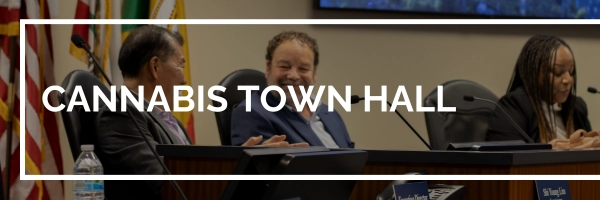
The City of Los Angeles Cannabis Regulation Commission (CRC) will host a special meeting at 3:30 PM PT, July 2, 2025, at Los Angeles City Council Chambers, 200 N. Spring St., Los Angeles, CA 90012, Room 340. The meeting will provide a forum for applicants, licensees, and trade association representatives to discuss taxation issues, make presentations, and allow for discussion with members of the Commission about tax implications for cannabis businesses. The entirety of this special meeting will be reserved for this town hall format and no annual license applications will be on the agenda.
For rules and requirements to make a presentation at this special CRC meeting, please click here.
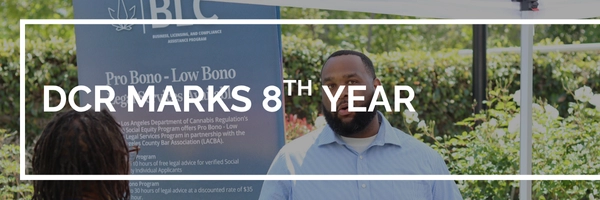
This month, DCR celebrates its 8th year in existence. At the time of its creation, DCR was tasked to create a legal framework to license cannabis businesses that included retail stores and its supply chain while protecting public health and safety. At the time, cannabis legalization was a new frontier and writing the rules as the infrastructure was built was the norm. Initially, eligible existing medical marijuana dispensaries were the first business type that could apply for a temporary approval to operate. Eventually, cultivation, manufacturing, distribution and testing labs were included in the temporary approval process.
As of May 2025, 315 businesses, or 90% of Temporary Approvals for retail storefront, were approved for the Annual License. Other license types have been transitioned into the Annual License process which is ongoing.
Throughout these years, DCR built a substantive Social Equity Program (SEP) designed to support those individuals most impacted by inequitable enforcement of past cannabis prohibition that now wanted a chance to start a business in this industry.
Today, there are more than 2,000 individuals that have qualified for Social Equity Individual Applicant status. To foster their development as an entrepreneur, DCR has created these programs:
Pro-Bono/Low-Bono Legal Services Program: Through a partnership with the Los Angeles County Bar Association’s Cannabis Section, SEIAs that have passed the Pre-Application stage have access to 40 hours of low-cost legal advice from an attorney -- the first 10 hours are free; 30 additional hours may be provided for only $35 per hour.
One-on-One Business Coaching: Through DCR’s network of business coaches, Social Equity Individual Applicants (SEIAs) can meet with subject matter experts for financial advice, to discuss business ideas, and everything in between to help build a brand and business.
Job Board - For those individuals ready for a career in the cannabis industry, the SEP has created a robust job board that helps connect employers with eager cannabis employees.
Learning Management System - SEIAs have the ability to learn about a new topic at their convenience through SEP’s online Learning Management System. Past webinars are stored here ready to be accessed 24/7.
Webinars - DCR offers a wide array of webinars for general and Social Equity applicants. For general applicants, DCR hosts a monthly Q&A Virtual Lunch Hour where attendees can ask executive staff about licensing, compliance, and policy matters related to the cannabis industry. Additionally, the SEP hosts various webinars that help the new or established entrepreneurs learn something new to help their cannabis business run smoothly and thrive. Past topics have included: advanced security, creating and protecting a brand, cannabis insurance needs, marketing and finding investors.
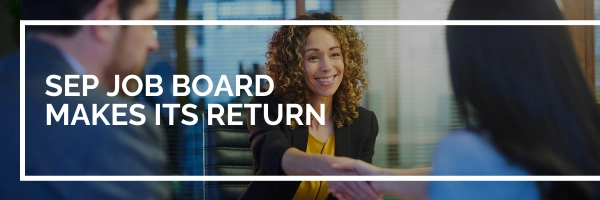
The Social Equity Program announces the re-launch of the Job Board that lists Los Angeles job opportunities in the cannabis industry. The current listing offers include positions from budtender to sales lead to bilingual HR assistance to accounting associates.
You can find out more about the job board under the Social Equity Program section on DCR’s new website for cannabis operators called Access Cannabis.
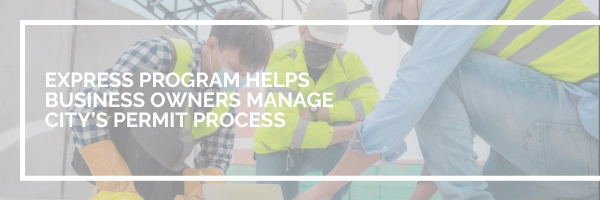
In light of the upcoming license renewal period, here’s some information on the Restaurant & Small Business Express Program (RSBEP). As a small business owner, you can get help moving through the permitting and inspection processes. This program was created as a direct result of Mayor Bass’ Executive Directive 4 and by a network of City departments including City Planning, Fire (LAFD), Bureau of Sanitation, Public Health Department, Department of Water and Power, and the Department of Building and Safety (DBS).
When you request assistance from the Restaurant & Small Business Express Program, a Case Manager will be assigned to each establishment to assist with the various permit/compliance stages including: 1) design; 2) permitting; 3) construction; and 4) completion.
For more information on the program, click here and here. For the application to participate, click here.
DCR Welcomes the Newest Cannabis Regulation Commissioner
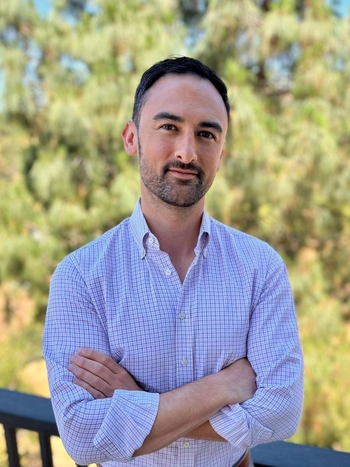
Adam Z. Bierman is a legal, regulatory, and policy professional with a passion for solving complex problems at the intersection of law, innovation, and public good. Before returning to the private sector, Adam spent several years in public service in Los Angeles, working for former Mayor Eric Garcetti and as a Deputy City Attorney, where he spearheaded strategic litigation efforts to enhance public safety and improve quality of life across LA neighborhoods.
Currently, Adam works in the tech sector where he leads on global regulatory efforts focused on emerging technology, including scaling autonomous mobility and delivery, responsibly harnessing the power of artificial intelligence, and other transformative innovations.
Adam earned his J.D. from UC Berkeley School of Law where he was awarded Order of the Coif, and graduated summa cum laude from UCLA. He lives in Northeast Los Angeles with his family. A proud Angeleno, Adam sees public service as his civic duty and is honored to serve as a Commissioner for the city he calls home.
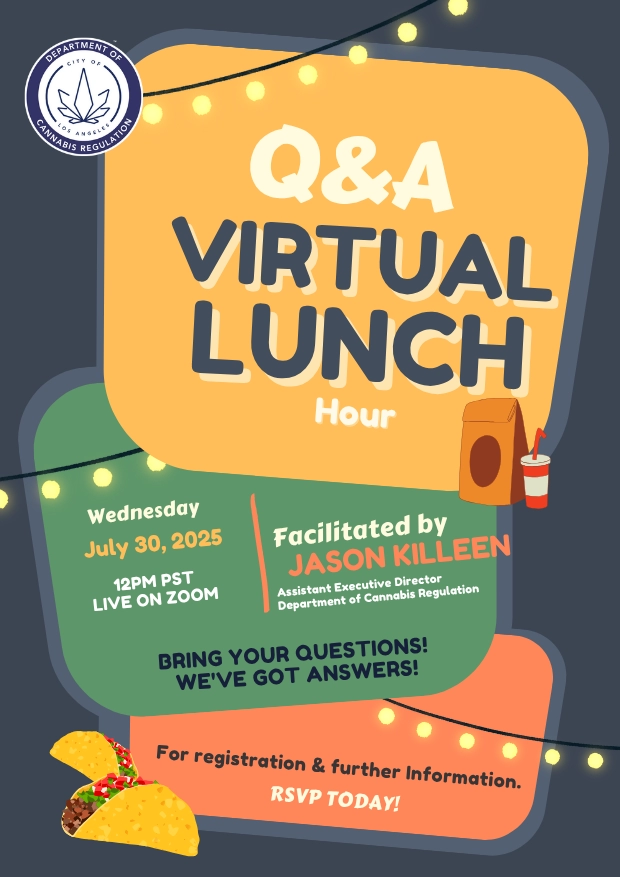
Next DCR Q&A Virtual Lunch is at noon, Wednesday, July 30, 2025. RSVP, submit questions and join here.

Don’t forget to follow us on social media:
